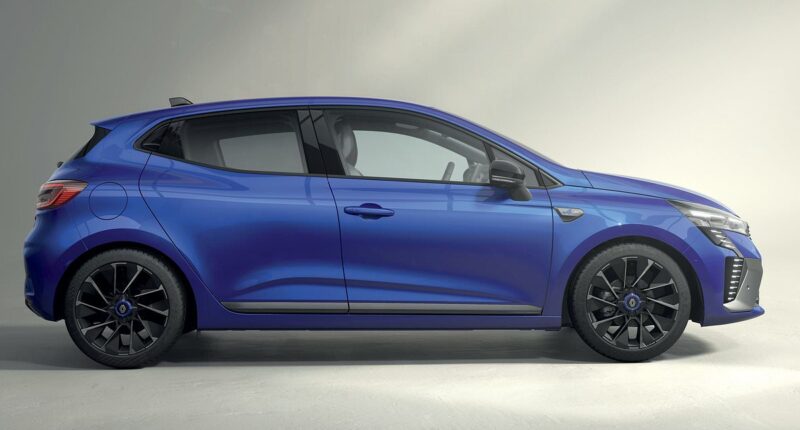
French car maker Renault has announced it will fit speed limiters to one of its most popular small models in an effort to improve road safety.
Part of its new ‘Human First’ initiative launched over the weekend includes installation of speed limiters in Clio superminis.
This will restrict the top speed to 68mph – 2mph below the motorway national limit in the UK.
Referred to as the ‘safety car’ package, the limiter feature is presently solely offered for Clios sold in France, with the possibility of it being extended to cars in the UK as well, an exclusive report by This is Money discloses.
The introduction of this technology comes as a response to the deceleration in the decrease of road fatalities observed since 2010. Over half (52 per cent) of fatal accidents resulting from speeding are attributed to drivers under 35 years of age, according to the car manufacturer.
Starting from 2022, all new Renault vehicles come equipped with automatic limiters that restrict the speed to 112mph, and in the previous year, models were fitted with a new system that evaluates a driver’s behavior – penalizing speeding, tailgating, and erratic lane changes.
Renault says only the Clio will be available with the speed limiting device, due to its popularity among learners and new drivers.
It said this ‘practical solution to limit maximum speed to 110 km/h’ will be reversible, meaning owners can turn it off at a later date.
However, they will need to access a Renault Network dealer to have the system removed.
This speed limiter is a post-sale engine control unit configuration that restricts the vehicle’s speed setting, cruise control, and speed limiter to 68mph by default.
Once activated, the driver can still set the cruise control and adjustable speed limiter, but without exceeding the maximum speed mentioned.
It will likely prove popular among parents looking to place restrictions on their children’s driving in their initial years on the road – but it does come at a cost.
The price to have it installed is €59, which works out at just over £50.
It is likely that drivers who have it fitted could be rewarded with cheaper insurance premiums with the device reducing their risk on the road.
‘At present, the system is only available in France,’ a spokesperson for the brand told us.
However, they added: ‘It’s potential for the UK will be evaluated, but at present it is not an option.’
And it’s not the only forward-thinking piece of technology Renault is fitting to its latest passenger cars in a bid to improve driving standards…
Renaults are already rating your driving out of 100
Last year, it launched its ‘Safety Score’ feature, which issues owners with a personalised mark out of 100 at the end of each trip in the hope they will compete with each other to get the best ratings and improve road safety.
Marks are docked if any of the vehicle’s suite of Advanced Driver-Assistance Systems (ADAS) kick in during the journey, including lane assist, automated emergency braking (AEB) and the driver drowsiness warning feature.
It is also linked to the car’s Intelligent Speed Assistance (ISA), which is fitted to all new Renaults as of last year and alerts motorists when they are exceeding a speed limit at any given time on their journey.
The safety score feature has also been available in the UK from summer 2024 on new Renault models, a spokesperson for the brand told This is Money last year.
Points are scrubbed off your safety score if ADAS safety features are triggered during the journey.
For instance, if a motorist veers over the dividing white lines between lanes on a motorway and the car’s lane assist system sounds an alert or steers the vehicle back into the lane, points will be deducted.
Marks are taken off if the car’s AEB feature intervenes to automatically apply the brakes when it believes a collision with a vehicle or object ahead is imminent.
It will dock points if cameras and radars linked to the adaptive cruise control has alerted the user that they are travelling too close to a vehicle in front, and if a driver drowsiness warning has been activated during the journey.
The Safety Score results can be stored and be made available to drivers to hand to insurers to secure lower premiums.
This would be similar to motorists taking out ‘black box’ telematics policies, which are growing in popularity among inexperienced drivers who face sky-high premiums.
By having a black box installed in their cars, young motorists are able to secure cheaper insurance by allowing their provider to monitor if they’re safe behind the wheel or not.
Safe driving performance is rewarded with lowered insurance premiums. while frequent instances of drivers speeding, accelerating too hard or braking heavily can be used to hike prices.
It is unclear if safety scores recorded in Renault’s system can be shared with insurers, with the car maker refusing to comment when approached by This is Money.
However, the French brand has suggested the feature will be used to encourage ‘positive attitude and not point fingers of blame’.

















